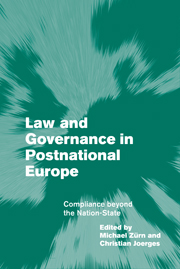Book contents
- Frontmatter
- Contents
- List of tables
- Notes on contributors
- Preface
- 1 Introduction: Law and compliance at different levels
- 2 The analysis of compliance with international rules: Definitions, variables, and methodology
- 3 State aid control at the national, European, and international level
- 4 Domestic limits of supranational law: Comparing compliance with European and international foodstuffs regulations
- 5 Politics of intergovernmental redistribution: Comparing compliance with European and federal redistributive regulations
- 6 Conclusions – the conditions of compliance
- 7 Compliance research in legal perspectives
- References
- Index
5 - Politics of intergovernmental redistribution: Comparing compliance with European and federal redistributive regulations
Published online by Cambridge University Press: 22 September 2009
- Frontmatter
- Contents
- List of tables
- Notes on contributors
- Preface
- 1 Introduction: Law and compliance at different levels
- 2 The analysis of compliance with international rules: Definitions, variables, and methodology
- 3 State aid control at the national, European, and international level
- 4 Domestic limits of supranational law: Comparing compliance with European and international foodstuffs regulations
- 5 Politics of intergovernmental redistribution: Comparing compliance with European and federal redistributive regulations
- 6 Conclusions – the conditions of compliance
- 7 Compliance research in legal perspectives
- References
- Index
Summary
Intergovernmental redistribution
Intergovernmental redistributive arrangements have to date been largely neglected in analyzing international relations and researching questions of international compliance. Game theorists argue that the paucity of intergovernmental redistribution is explained by the fact that redistributive policies are appropriately modeled as zero-sum games in which any gain for one party corresponds to an equivalent loss for the other (Morrow 1994). Since states are taken to be self-referring agents, which “develop their own strategies, chart their own courses, make their own decisions” (Waltz 1979: 96), the emergence of a redistributive regime and compliance with it, on the part of those who have to pay into it, must be regarded as extremely unlikely. Since the enlightened self-interest of the addressees of the regulations cannot be relied upon to ensure payment, an intergovernmental central body is required which is able, in doubtful cases, to enforce compliance even against resistance. It may thus be argued that the fact that there is no significant international redistributive regime is ultimately attributable to the anarchical nature of the international system.
Alongside this state-oriented explanation, one can also find an explanation in the literature that is informed by the communitarian theoretical tradition. Miller (1988) and Goodin (1988) point out that questions of justice can meaningfully be dealt with only in the context of a political community which has a shared understanding of the content of sound policy.
- Type
- Chapter
- Information
- Law and Governance in Postnational EuropeCompliance Beyond the Nation-State, pp. 149 - 182Publisher: Cambridge University PressPrint publication year: 2005



